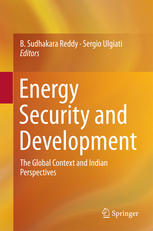

Most ebook files are in PDF format, so you can easily read them using various software such as Foxit Reader or directly on the Google Chrome browser.
Some ebook files are released by publishers in other formats such as .awz, .mobi, .epub, .fb2, etc. You may need to install specific software to read these formats on mobile/PC, such as Calibre.
Please read the tutorial at this link: https://ebookbell.com/faq
We offer FREE conversion to the popular formats you request; however, this may take some time. Therefore, right after payment, please email us, and we will try to provide the service as quickly as possible.
For some exceptional file formats or broken links (if any), please refrain from opening any disputes. Instead, email us first, and we will try to assist within a maximum of 6 hours.
EbookBell Team

4.7
56 reviewsThis volume provides a systematic framework for energy suppliers, policy makers, academics, students, and all others interested in energy security, and analyzes key issues concerning energy, security and sustainability with the help of a wealth of data. While sustainability is the broadest objective, energy security is an important part of it, at the global, national and societal levels. The development of a sustainable, long-term solution to meeting the world’s energy needs is a defining issue of our time, since central global challenges that the world faces—poverty alleviation, climate change, and environmental degradation—are directly linked to energy security. The contributions cover key issues in sustainable energy and illustrate that the insecurity of a majority of countries owes to internal factors which have more to do with market forces, inefficient technologies, lack of institutions, environmental insecurity, pricing mechanisms, etc., and less to do with the international situation.
The links between energy and development are both direct and indirect. Directly, energy provides several services and utilities to maintain human well-being, and also does so indirectly through stakeholders. This volume addresses both the direct and indirect links and provides sustainable alternatives, helping readers to better grasp the resilience of both socio-economic and resource sub-systems in the process. The issues affecting energy supply and demand, including technology portfolios, environmental considerations and consumer attitudes are thoroughly discussed. One of the critical questions that arises is how to facilitate energy investment. The investment climate and the key issues involved are analyzed, including: the capital flows with reasonable and stable investment frameworks, timely decision-making by governments, and open markets. The broad objective of the volume is to foster a deeper understanding of the concept of energy security and to identify the methods of analysis, policy initiatives and future research needed to generate a balanced pattern of energy use and mitigate its impact on humanity and the environment.